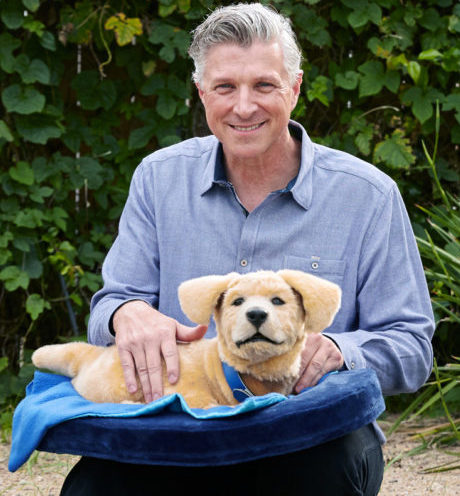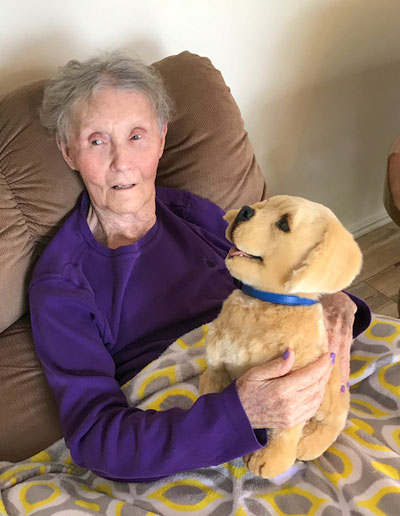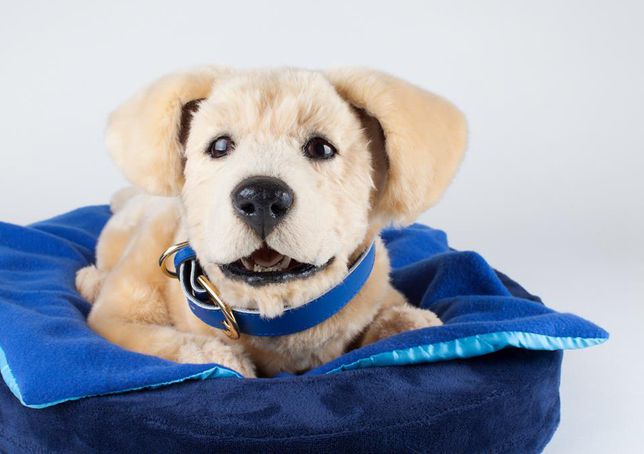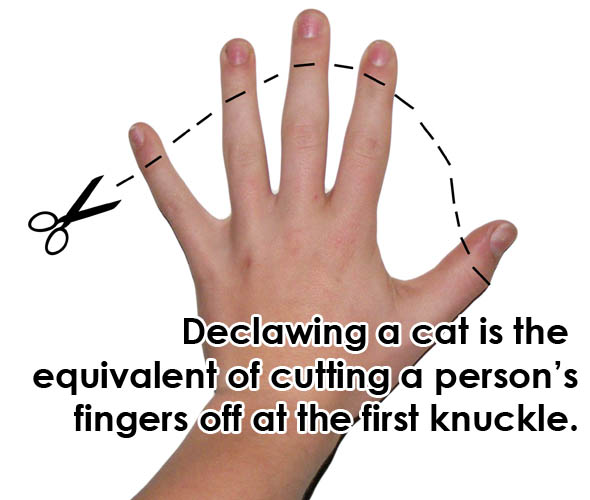Robotic Puppies - Not Toys
Tom Stevens, Tombot
 Scientists estimate as many as 97-percent of seniors suffer from behavioral and psychological symptoms of dementia. That's why Tom Stevens, the CEO from Tombot, teamed up with Jim Henson's Creature Shop to create an affordable robotic puppy to provide companionship for seniors. Tom explains why this is so personal and how it's making a difference.
Scientists estimate as many as 97-percent of seniors suffer from behavioral and psychological symptoms of dementia. That's why Tom Stevens, the CEO from Tombot, teamed up with Jim Henson's Creature Shop to create an affordable robotic puppy to provide companionship for seniors. Tom explains why this is so personal and how it's making a difference.
Robotic dogs have been around for a few years and play a very important role for those that have Alzheimer's or dementia. While the previous robotic dogs haven't been very lifelike and were very expensive, Tom has a new invention, Tombot, an affordable lifelike dog with lifelike movements.
The invention of Tombot came from necessity. In 2011, Tom's mother was diagnosed with Alzheimer's. Of the many bad days they went through early on, by far the worst was when he had to take away her dog. She had a beautiful 2-year-old Golden Doodle. While these dogs ordinarily have a lovely disposition, his mother had actually managed to train her dog to be aggressive towards her caregiver, who she did not like very much. Because of this, anytime the caregiver would enter the room, the dog would growl. His mom would then laugh and pet her dog, reinforcing the bad behavior. It was no surprise that it wasn't very long before Tom had a real problem on his hands. Fortunately, he was able to find a new home for his mother's dog with some close family friends, but his mother was devastated.
Growing up in a house full of animals, Tom's mother was really the impetus behind all of the animals they had. She always treasured animals and particularly dogs. This Golden Doodle was her last animal and her primary companion at home. Removing her dog was almost like taking off her leg.
When learning more about his mother's disease and her circumstances, Tom found that they weren't unique, in that she had Alzheimer's and was not able to safely or practically care for a live animal, as do a lot of seniors. Tom then started looking around for substitutes for live animal companions and he didn't find anything that he liked that was either affordable or something that his mother would respond to. So he started experimenting with robots and found that she responded quite readily to them.
Tom's background is in hi-tech and he's been in the computer world for about 35 years. So he was naturally curious as to whether technology might be able to play a role. In his research, he came across some of the more expensive robots and read the science and found that they actually provide quite a bit of relief from the symptoms associated with dementia. But the fact was, they were simply too expensive. So he thought that, well, maybe a more affordable version might make some sense!
In creating Tombot, the first thing that Tom learned is that anything on the ground is an extreme tripping hazard for a senior with dementia. Seniors frequently trip and fall, oftentimes over their own pet. So he learned that if he was going to be effective and provide something that was safe for use, it needed to be a lap dog and not a dog that could walk around.
 In all, Tom's worked with over 700 seniors with dementia. He learned that first of all, they preferred animated objects to non-animated objects, or things that moved. Secondly, they preferred realistic appearance to toy-like or cartoon-like or abstract appearance. Thirdly, and most importantly, they preferred objects that behaved realistically, and he didn't know how to do that.
In all, Tom's worked with over 700 seniors with dementia. He learned that first of all, they preferred animated objects to non-animated objects, or things that moved. Secondly, they preferred realistic appearance to toy-like or cartoon-like or abstract appearance. Thirdly, and most importantly, they preferred objects that behaved realistically, and he didn't know how to do that.
So Tom went looking in the animatronics world, knowing that being in Hollywood already was convenient for his search. He ended up selecting the Jim Henson's Creature Shop to provide the artistic design service for their dog. Jim Henson was the creator of the Muppets, which are very lifelike looking puppets.
It turns out the two creative heads there, a gentleman who's the head of the creative director and another gentleman who is the head of Animatronics; both had fathers at that time who were suffering from dementia. So they had a very strong personal connection to Tom's mission and felt that this was something that was really appropriate for them to work on. They began with simply experimenting with how to replicate the internal anatomy of an actual dog.
They went through multiple rounds of trials to come up with something that they really liked and created Jenny, which is his fifth generation prototype. Jenny is designed to lay comfortably on the lap of a senior, or on a chair, or a table close by, anywhere that they can remain in close physical contact. The animations include eyes, ears, eyebrows, mouth, neck and tail capabilities. Jenny has 16 servo motors, seven alone in her neck, and that's what gives Jenny the ability to not only have significant range of movement, but have those fine motor movements that are so common to a living animal. Then they tested that with the seniors to get their response.
Unfortunately, Tom's mother passed away this last October, but for years, he worked together with her, having her test the prototypes, and it was what she wanted to talk about. Alzheimer's and other forms of dementia are very, very difficult on family members. As a result, many difficult decisions have to be made that are frustrating. From a child's perspective, taking over for a parent was emotionally very difficult. However, the robot gave them a point of commonality where they could come together and work together. This was always what his mother wanted to talk about first whenever Tom saw her. She would ask things like, "How are the robots coming? Do you have the next one for me?"
Tom's mother always knew it was a robot and there was an ethical concern that Tom had from the very beginning in that he didn't want to trick anybody. It turns out that people with dementia, whether it's mild or moderate dementia, they know that it's a robot and actually prefer that it's a robot to a live animal. For those with severe dementia, they may or may not be able to distinguish between a live animal and the robot, but up until that point they are able to distinguish between the two.
Tombot has just finished a preorder campaign on Kickstarter and they are now active in manufacturing. However, first customer shipments will not be until May of 2020. So it's still a little ways before they will be in the customer's hands. They are currently in between preorder campaigns, but they will probably re-launch that in the next month or two.
Tom tells us that they are receiving an overwhelming response to Tombot, not only from spouses or children of people with dementia, but also for a number of other uses. They even have quite a few that were preordered for children with autism. Adults that have major depressive disorder or PTSD are even buying them for themselves.
 Tombot is also working with the nation's largest chain of hospitals for inpatient use in places where live therapy animals are not typically allowed to visit, such as the emergency room or an ICU.
Tombot is also working with the nation's largest chain of hospitals for inpatient use in places where live therapy animals are not typically allowed to visit, such as the emergency room or an ICU.
Tombot is a mission-based company. Tom explains that he had the good fortune of selling his company a few years ago and thought he was retired. That was the same year that his mother was diagnosed with Alzheimer's. It really gave him a focus, meaning and purpose for how he would spend the next several years. It's important for him to be able to make a difference and his products actually provide a medical benefit. It's not an entertainment device. It's not something that you would buy as opposed to your next Sony PlayStation. It really is meant to provide someone with the ability to self soothe through anxiety, loneliness and depression, where they can't safely or practically own a live animal.
To learn more about what Tombot is doing, you can follow them on Facebook or Instagram.
Visit Website
Who Doesn't Like Dogs? - Dr. Debbie
 I love dogs, and always have. But what happens when you discover a close friend doesn't merely not like dogs, but actually hates them?
I love dogs, and always have. But what happens when you discover a close friend doesn't merely not like dogs, but actually hates them?
I've been operating under the assumption that those who don't like dogs must have some evil lurking in their spirit and were destined to a life of incarceration. Just look at the statistics of criminals that abuse animals early on and who later progress to physical abuse of people, murder, or other sociopathic behaviors.
I'll admit not liking dogs is a far cry from turning one's hand to injure an animal or person, but some uncomfortable association is still there. As a full-fledged dog lover, or enthusiast of any animal for that matter, I cannot understand the psyche of an individual that is satisfied going about their life without animal companionship.
Any pet lover can spout off a list of benefits their furry one brings to their life…the steady comfort of companionship, a non-judging ear to hear out the day's tribulations, a workout or hiking buddy and a source of unconditional love at the end of a long day.
So, imagine my shock when I realized that a couple I know doesn't like dogs. Not just that they don't have dogs or misunderstand them - they actually dislike dogs.
Hint of this fact should have been apparent a long ago when they were over for dinner and they politely stood stiff as Calvary front line, when greeted by my yapping terrier mix. Or that they failed to stroke my Labrador's chin after receiving the gentle nudge of the typical canine greeting upon entering the home. The polite perfunctory smiles went un-noticed by me. "Sure, they don't have dogs," I reasoned as to why they weren't charmed by my little dog's amusing tail wagging display or by the steadfast devotion of my Labrador's greeting.
All of these sign posts I missed. I clearly misjudged all along. The couple, who I just assumed were just not yet fortunate to understand the benefits of pet companionship, were actually formidable dog dislikers.
Realization struck me during a recent conversation with this couple. I was laughingly describing the vast differences in dog breed behavior comparing my former Labradors, to that of my current Bouvier. My comments must have been mistaken as some underhanded means to convince them the right breed was out there for them. At that moment, my guest raised hands and said, "I know what I like and don't like, and I don't want dogs." Clearly they didn't like dogs - and they misunderstood my comment as some means to turn them over to the canine side against their will. Astounded, I marveled how this response was not unlike a person who is recommended a mushroom containing side dish or gourmet meal from a fine restaurant, and who declares "I can't stand mushrooms and don't want anything to do with mushrooms!"
 So why didn't I catch on to these dog haters sooner? For those of us that have pets, of any type, we recognize the many joys our pets bring to our lives. There are folks that don't want to bring that companionship into their life. The cogs of their lives have clicked along just fine without a pet in their life. Somehow lots of well-educated, social and seemingly normal people can raise a family and be successful and still dislike dogs.
So why didn't I catch on to these dog haters sooner? For those of us that have pets, of any type, we recognize the many joys our pets bring to our lives. There are folks that don't want to bring that companionship into their life. The cogs of their lives have clicked along just fine without a pet in their life. Somehow lots of well-educated, social and seemingly normal people can raise a family and be successful and still dislike dogs.
Maybe we should feel sorry for them. Or maybe they feel sorry for us, for all the money, heart and time we put into a pet companion who's lifespan doesn't come near to that of a humans. They probably laugh at our reckless expenditures on a being who lives just a fraction of human life. I chose not to spend time wondering how they have made it without animals in their life…rather that I have succeeded because I have been fortunate to have animals in my life.
I ask that these non-pet people save their pity for me and my pets, because I know that any one of my dogs could say they lived live fuller than most people - full with adventure, splendor at new experiences and embracing the moment. And so have I at their side. So should the question come up at the time of my next life, I'll take both a side of mushrooms…and pets on the side.
Featured veterinarian known as "Dr. Debbie" on national pet radio program, Animal Radio. Ebook author of "Yorkshire Terriers: How to Be Your Dog's Best Friend"; "Pugs: How to Be Your Dog's Best Friend"; "Mini Schnauzers: How to Be Your Dog's Best Friend"; and "Shih Tzu: How to Be Your Dog's Best Friend." Dr. Debbie's books.
Visit Website
Animal Radio News - Lori Brooks
 Animal-Free Mouse Treats For Cats
Animal-Free Mouse Treats For Cats
A pet nutrition startup is aiming to launch a line of clean meat for cats made from cultured mouse cells. The US based startup is working on clean mouse meat cat treats, based on a cat's natural prey. "This meat is packed with the same protein that a cat in the wild would consume and does not contain the growth steroids or any trace of Salmonella and Listeria found in meat used to make commercial pet food," states the website. Unlike many companies working in the clean meat industry, the product is also entirely animal-free. It's kind of complicated, but fetal serum from cows is used to create lab-grown protein. It's called cellular agriculture and what it does is offer the opportunity to efficiently produce protein food sources for our pets while reducing the environmental impact of raising and feeding all those traditional food sources.
 Beards Carry More Germs Than Dogs
Beards Carry More Germs Than Dogs
If you don't kiss your dog, but your significant other has a beard, heads up! A new study finds that men with beards carry more germs in their beards than a dog's normal germs. Swiss researchers tested the facial hair of men and dog fur from various breeds and found a significantly higher bacterial load in the men's beards compared with the dogs' fur. Some of the men tested positive for microbes that actually posed a threat to human health. Experts say men should shampoo their beards regularly.
Planning To Rob A Store? Don't Take Your Dog!
Police in Wisconsin say a woman, her adult son and a dog named "Bo" caused quite the scene in a Wisconsin Walmart this month. According to a post on the Police Department's Facebook page, they responded to a Walmart shopping center for reports of a theft. When they arrived, officers found 46-year-old Lisa Smith screaming in the store's entryway trying to catch her unleashed dog, Bo. While the mother was in the front of the store, her 25-year-old son was allegedly naked and exposing himself to customers in the clothing section of the store. Bo, still unleashed and on the loose, grabbed a box of Bread Muffin Mix and attempted to leave the store. Eventually everyone was rounded up. The two humans were arrested and Bo was taken to the Humane Society.
 Did Actor Keanu Reeves Save Dozens of Cats from Euthanasia or Not?
Did Actor Keanu Reeves Save Dozens of Cats from Euthanasia or Not?
In addition to being a movie star, Keanu Reeves has a reputation for simply being a good person. The Internet is full of stories celebrating his many acts of kindness. However, you can't believe everything you read online. That's not to say Keanu isn't a nice guy, but stories are made up about him doing nice things because of this. For example, earlier this month, the Facebook page "Love Gatos" (Love Cats) claimed that Reeves had saved numerous cats from euthanasia and the post included an image that showed the actor with dozens of feline friends that supposedly live in a special home bought just for them. Unfortunately, it's the same photo-shopped imaged of Reeves that has circulated on the Internet for several years, which originally had an image of another man.
 California Considers Statewide De-Clawing Ban
California Considers Statewide De-Clawing Ban
A California State Assembly committee is considering a bill to ban the de-clawing of cats in what will be the first step for statewide approval and adding momentum for federal laws against the practice.
National Cat Lady Day
Mark your calendar, April 19 is National Cat Lady Day. Your chance to celebrate Cat Lady Day this year is gone, but you don't want to miss it next year. The special day was first observed in 2017 at the annual Cat Con convention in Los Angeles as a way to debunk the myth that cat ladies are dowdy spinsters.
 Listen to the entire Podcast of this show (#1013)
Listen to the entire Podcast of this show (#1013)





